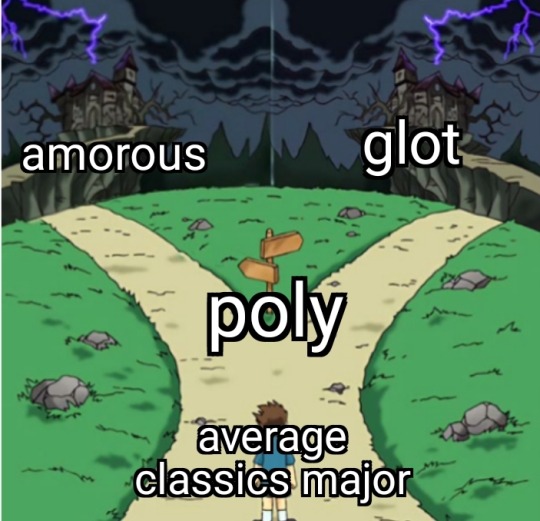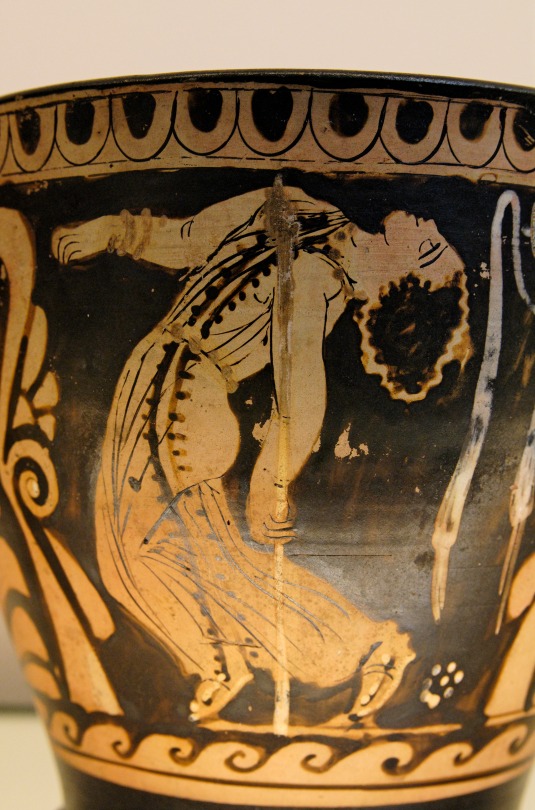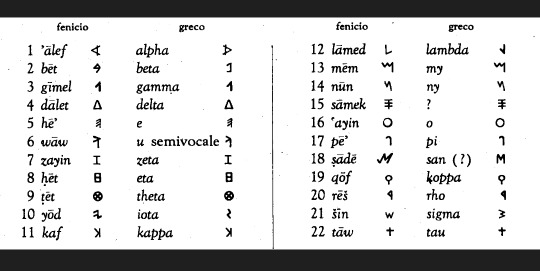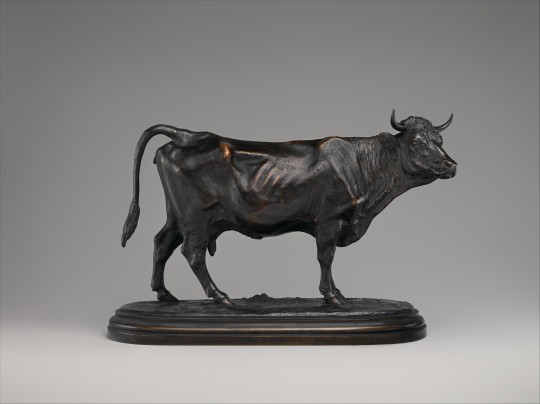#ancient greek langblr
Text
i am learning ancient greek! this is my drive ov resources if anyone is interested
#langblr#ancient greek#ancient languages#ancient greek langblr#am i the only one!!#that's okay#tagamemnon
33 notes
·
View notes
Text

He’s helping.
19 notes
·
View notes
Text
Green horses
More Greek etymological madness!
There is a saying in modern Greek, πράσινα άλογα (prásina álogha), which literally means “green horses”. It is usually added to the end of a sentence to show that something is crazy, unbelievable, foolish and to express disbelief for a statement.
i.e «Είπε ότι θα είναι πάντα στην ώρα του από δω και στο εξής και πράσινα άλογα»
(“He said he will always be on time from now on and green horses”)
The sentence indicates that the person has not stopped being late or that there is disbelief expressed that this person has the ability to even start trying being on time.
Why green horses though? How did this come to be?
Interestingly, no, it was not formed as a concept due to the inherent improbability of a horse being green. It originally had nothing to do with horses, let alone green ones.
The phrase originates from the ancient «πράσσειν άλογα» (prásin álogha) which means “acting thoughtlessly”.
The sound similarity between πράσσειν (prásin, acting) and πράσινα (prásina, green) is entirely incidental. The άλογα (álogha, thoughtlessly / horses) is on the contrary the same word! You see, the “official” Greek word for horse is ίππος (hippos or ippos). However, all animals were often called in ancient and especially medieval times as άλογα, from the negative α- and the noun λόγος which means logic, reason. Therefore animals were called álogha, beings without logic. The more the language evolved the word started describing horses more specific until in modern Greek it became the standard word for horse, overcoming ίππος by a long shot.
The phrase was surviving throughout in some way or another, however now the meaning of άλογα was getting enriched (it still also means “thoughtlessly”). Simultaneously, the infinitive «πράσσειν» was slowly fading, especially because its other lexical variant «πράττειν» (prátin, also means acting) was more popular and its verb is still used in its -t- variant nowadays.
So as πράσσειν was gradually becoming rarer and άλογα was getting a double meaning, people either out of humour or out of poor vocabulary morphed the phrase into πράσινα άλογα, green horses!
Interestingly it still expresses judgement against someone’s perceived stupidity, unreliability or madness (acting thoughtlessly)!
#greece#Greek#languages#language stuff#linguistics#langblr#Greek language#modern Greek#Ancient Greek#medieval Greek#Greek culture
148 notes
·
View notes
Text

#polyamorous#polyamory#polyglot#language#languages#langblr#greek#latin#ancient greek#classics#mine ☜
35 notes
·
View notes
Text
On a Statue of a Bacchant at Byzantium
Anthologia Planudea 57 = Paulus Silentiarius (6th cent. CE)
It was not Nature, but rather Art
That made the Bacchant out of her mind
And mingled madness throughout the stone.
ἔκφρονα τὴν βάκχην οὐχ ἡ φύσις, ἀλλ᾽ ἡ τέχνη
θήκατο, καὶ μανίην ἐγκατέμιξε λίθῳ.

A dancing maenad. Detail from a red-figure skyphos by the painter Python, ca. 330-320 BCE. From Paestum (Poseidonia), Italy; now in the British Museum. Photo credit: © Marie-Lan Nguyen / Wikimedia Commons.
#classics#tagamemnon#Ancient Greece#Greek#Ancient Greek#Greek language#Ancient Greek language#Greek translation#Ancient Greek translation#langblr#poem#poetry#poetry in translation#Greek poetry#Ancient Greek poetry#Byzantine Empire#Byzantine poetry#Paulus Silentarius#Paul the Silentiary#couplet#elegiac couplets#epigram#Anthologia Planudea#Planudean Anthology#Anthologia Graeca#Greek Anthology
310 notes
·
View notes
Text
hey im new to language learning on tumblr but can anyone rec me the best way out of romance languages? like what non-romance lang to start learning if ik or am already working on like spanish french portuguese?
#someone told me spanish to arabic is easy but obviously ‘easy’ is a false concept in language learning lmao#but other than like catalan or romanian or italian im running out of languages to be adding to the resume#and i feel like at a certain piint it’s just memorizing vocab differences and like 600+ verb tenses#like whats something i’ll reasonably be able to pronounce w/in the bounds of being decent at french pronounciation? but is built different#than a romance lang?#arabic? fuckin ancient greek??#language learning#langblr
75 notes
·
View notes
Text


🌸 17.11.23
Had a low energy day so I spent quite some time in bed and I skipped my classes 🥲
I did catch up on european literature, watched the lecture that I missed on monday, reviewed some greek verbs, and did my translation for Latin (which I did cover up in the photo because it's probably a shitty ass translation and I don't need you to judge me xx)
24 notes
·
View notes
Text
Daily French Etymology #56
Autochtone (native)
Autochtone came from the Ancient Greek autókhthōn, meaning indigenous or native. It was derived from auto-, meaning self, and khthṓn, meaning earth or soil, thus it literally translates to 'spring from the earth'. Khthṓn came from the Proto-Hellenic *kʰtʰṓn, from the PIE root *dʰéǵʰōm, meaning earth or human.
Derived from this same root is the English word chthonic, which means living under or inside the earth, especially deities from ancient mythologies, such as Hades and the Furies in Greek mythology.
#linguistics#etymology#lingblr#root word#proto indo european#french#langblr#ancient greek#greek mythology
91 notes
·
View notes
Text
The Greeks:can we please copy your homework?
The Phoenicians: okay, but don't make it obvious
The Greeks:

139 notes
·
View notes
Text
I knew my Ancient Greek knowledge would come in handy some day!
At work we're hosting a meeting that representatives of all EU member states will attend, since Spain currently hosts the rotatory EU Presidency, and today we had to set the placards with each country's name in their official language(s) on the table. However, I realized that Greece's one said Ελλςα (Elsa) instead of Ελλας (Hellas), so we had to quickly have the correct one printed out.
Imagine the face of the Greek delegate if they had seen their placard being "Elsa", like the main character in Frozen 🙃😂
10 notes
·
View notes
Text
My Greek professor described trying to translate an ancient Greek sentence is like building Ikea furniture: you have to do it right even if things look similar, you can't just jam two things together
#i love him saying Read the Ikea instructions! when we translate things wrong#ancient greek#tagamemnon#langblr#Gréigis ársa#edward caws
11 notes
·
View notes
Text




life part two + iliad book one = me being the student ov all time... Διὸς δ' έτελείετο βουλὴ
#studyblr#tagamemnon#langblr#ancient greek langblr#ancient greek studyblr#studyspo#studyinspo#classics#ancient greek
23 notes
·
View notes
Text
you know what? fuck you. *conjugates you like a middle verb*
58 notes
·
View notes
Text
I might have written about this before but: to people who are weirded out Modern Greeks call Zeus Δίας (Dias).
The original name of Zeus, first attested in Mycenaean Greek Linear B scripts (1400-1200 BC), was di-we, di-wo, from the possible Proto-Hellenic form *dzeus, from possible PIE root being *dewos, meaning "god". That d-strong form in Mycenaean was later retained better in the secondary forms of the noun, meaning the cases apart from the nominative.
Nominative: ὁ Ζεύς (o Zeus)
Genitive: τοῦ Διός (tou Dios)
Dative: τῷ Διῐ́ (to Dii)
Accusative: τὸν Δίᾰ (ton Dia)
Vocative: ὦ! Ζεῦ (oh Zeu)
The theorized z-including form *dzeus in Proto-hellenic survived better in some Greek dialects but even less so in others:
Δάν (Dán) — Aeolic
Δεύς (Deús) — Boeotian
Ζάς (Zás) — Laconian
Ζάν (Zán), Ζάς (Zás) — Doric
Ζήν (Zḗn) — poetic
Θιός (Thiós), Σιός (Siós) — Boeotian, Ionic
Τάν (Tán) — Cretan
As for Modern Greek, it has more often retained words through their secondary rather than their nominative cases, with the accusative case being the most common, like here.
#greek#greek language#ancient greek#modern greek#myceanean greek#languages#language stuff#linguistics#langblr#language learning#greek facts
176 notes
·
View notes
Text
here's a love letter in the form of a poem to all the obscure dead languages out there and the people who love them.
here's for dying languages!
the bloodstains between the letters,
the rips in their vocab lists,
never to be sutured up.
Here's for old languages!
never to be heard by a native speaker again.
#tagamemnon#ancient rome#langblr#breton#etruscan#hittite#uhh a lot more#ancient chinese#sanskrit#latin#ofc#ancient greek#old french#too many to name#akkadian#old norse#carolina Algonquian#etc etc etc#i just love them okay!!! they're like the weird old uncles of the language world who sit in the shadows and just watch and tell old stories
17 notes
·
View notes
Text
On a Realistic Cow Statue
Anthologia Palatina 9.719 = Leonidas of Tarentum (fl. 3rd cent. BCE)
Myron didn’t sculpt me – that’s a lie. As I was grazing
He drove me from my herd, bound me to a base of stone.
οὐκ ἔπλασέν με Μύρων, ἐψεύσατο: βοσκομέναν δὲ
ἐξ ἀγέλας ἐλάσας, δῆσε βάσει λιθίνῳ.

Cow, Isidore Bonheur (1827-1901)
#classics#tagamemnon#Greek#Greek language#Ancient Greek#Ancient Greek language#langblr#translation#Greek translation#Ancient Greek translation#poem#poetry#poetry in translation#Greek poetry#Ancient Greek poetry#Ancient Greece#Hellenistic period#Hellenistic poetry#Leonidas of Tarentum#epigram#ecphrasis#ecphrastic epigram#couplet#elegiac couplets#Anthologia Palatina#Palatine Anthology#Anthologia Graeca#Greek Anthology#Isidore Bonheur
295 notes
·
View notes